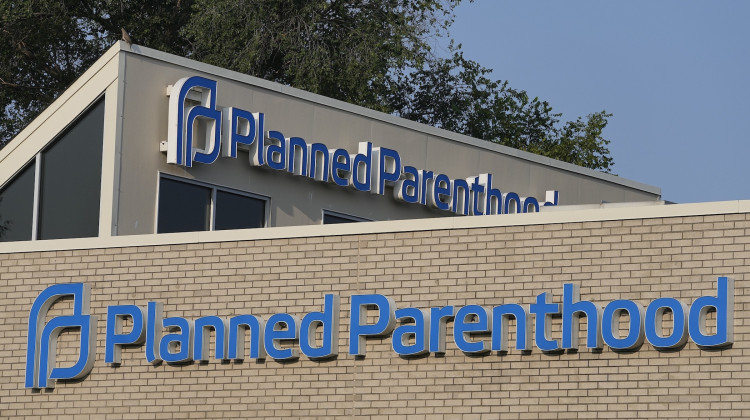
Chelsea Reed, 38, visits with her mother, Vanessa, who lives inside a nursing home on Indianapolis's east side.
Courtesy Chelsea ReedOn their last phone call, Chelsea Reed says her “proud” mother broke down, distraught about fears of dying alone in her long-term care facility, Rosewalk Village on Indianapolis’ east side.
“She had been calling me in tears, not wanting to die there,” Chelsea says about her 61-year-old mom, Vanessa.
She says her mother tested positive on November 17 and was quarantined in a wing reserved for COVID-19 patients before being transferred to a hospital. Chelsea says her mom is despondent after not being able to hug her family members since August.
“My mom's very strong, very independent, very kind-hearted,” she says. “When I think about the situation she's in, it just breaks my heart.”
The family is part of a fast-growing group: those anguished over a COVID surge in facilities that care for the most vulnerable. Recently, the nation’s nursing homes saw a record 12,000 new weekly cases — a milestone that came the same week Vanessa fell ill.
In a study updated this month, The American Health Care Association and National Center for Assisted Living report the Midwest is seeing a spike in coronavirus cases, mostly due to its spread among the general public. Nursing home cases jumped 120% in the region since mid-September.
Text messages shared with Side Effects and The Indianapolis Recorder show cases among Rosewalk residents rose from seven to 44 over a two-week span this month.
Chelsea says she was first notified about the positive coronavirus test from her mother, not from Rosewalk. She also says long holds on the phone and multiple call transfers are even more painful, considering that visiting restrictions bar family members from getting close to isolated loved ones.
“I feel depleted,” she says after hours spent on the phone trying to get health status updates. “My mom, she's a firecracker, but if this is how I’m feeling, I’m wondering how my mom’s feeling and what are other residents going through?”
Rosewalk’s corporate parent, American Senior Communities, says its facilities have provided residents options like emails, texts, and video chats to keep in touch with relatives. But the demand is great, the company says on its website.
Zach Cattell, president of the Indiana Health Care Association and the Indiana Center for Assisted Living, says by law and by best practice, they instruct all facilities to openly communicate with the family member of record, to explain protocols. “That gives people a lot of assurance."
The groups represent thousands of nursing homes and assisted living communities across the country, including American Senior Communities, he says.
COVID-19 also has taken a toll on the industry’s workers, Cattell says. “Folks are worn out.”
“This has been unprecedented,” he says of healthcare workers. “We have more testing capacity, but we can't manufacture people.”
As community spread has increased, Cattell says some healthcare workers are forced to stay home to quarantine, leaving the remaining staff stressed. “Within long-term care facilities, there are resilient people that care a lot about what they're doing and they're going to continue to fight for as long as it takes.”
He also says if there are concerns about care, family members or an appointed legal representative should first talk with the administrator at that facility.
In an emailed statement, a spokesperson for American Senior Communities says it is committed to open communication and comprehensive testing.
“We are deeply saddened whenever a resident or staff member becomes infected, and we grieve for each resident who has passed away," the statement says. "As residents begin to recover, we remain steadfast in protecting and continuing to serve them.
“Rosewalk Village continues to send proactive daily communications to resident representatives about the existence and extent of COVID-19 at the community that adheres to the guidance from the Indiana State Department of Health. We have also made this information available online.”
Lynn Clough, director of the state’s long-term care ombudsman program that advocates for residents, says under federal and state law, residents have the right to communicate with anyone they choose.
Clough says the ombudsman contact information should be eye-level for all residents in a public space in all nursing home facilities. She says the ombudsman serves as an extra set of eyes, now that the Indiana State Department of Health’s annual, unannounced visits to long-term care have been greatly reduced since March.
“We are still available, we’re just not as visible,” she says. “We do a lot of good.”
Cattell says his association is calling on Congress to end its partisan deadlock and prioritize vulnerable elderly populations. Most of the $175 billion in federal aid provided by the CARES Act in April has already been distributed. That means long-term care facilities may need more funds for cold and flu season.
Experts with the Indiana State Department of Health say when a vaccine becomes available, frontline healthcare workers — including those in long-term care facilities — will be first in line to receive it. Until then, Dr. Kristina Box says people should continue to wash their hands for at least 20 seconds, wear a mask and stay six feet apart.
Chelsea would add compassion and communication to that list.
“I'm a woman of faith and I understand that you're doing your best,” she says. “But this is someone's life. We’re all hurting. We all need grace.”
For help from the state ombudsman program, you can file a complaint or email the state’s local health department outreach division familyoutreach@isdh.in.gov.
This story was produced by Side Effects Public Media, a news collaborative covering public health.
 DONATE
DONATE






 Support WFYI. We can't do it without you.
Support WFYI. We can't do it without you.